The Top 5 Foods for a Healthy Gut
The top 5 foods for a healthy gut are yogurt, kefir, sauerkraut, kimchi, and kombucha. These foods contain probiotics that help to maintain a healthy balance of bacteria in the gut, promoting digestion and reducing inflammation. Incorporating these foods into your diet can improve gut health and overall well-being.
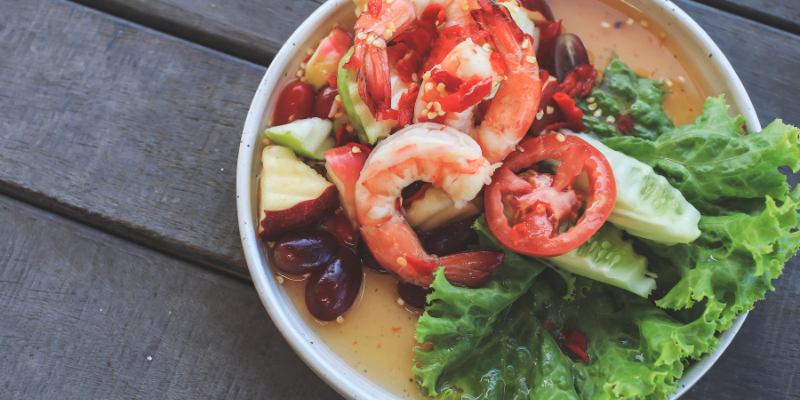
Introduction
Definition of Gut Health and Why it Matters
Gut health refers to the proper functioning and balance of the digestive system, including the microbiome. It matters because it affects overall health, including digestion, immune function, mental health, and more. Poor gut health can lead to a range of issues, from digestive problems to chronic diseases.
Overview of the Link Between Diet and Gut Health
Diet plays a crucial role in maintaining good gut health. The foods we eat can either nourish or harm the gut microbiome, which in turn can affect digestion, inflammation, immune function, and more. A balanced and varied diet that includes fiber-rich fruits and vegetables, probiotic-rich fermented foods, and prebiotic-rich foods can help promote a healthy gut. On the other hand, a diet high in processed foods, sugar, and unhealthy fats can disrupt the microbiome and lead to poor gut health.
Brief Summary of the Top 5 Foods For a Healthy Gut
The top 5 foods for a healthy gut are:
- Probiotic-rich foods like yogurt and sauerkraut
- Fiber-rich foods like fruits, vegetables, and whole grains
- Prebiotic-rich foods like garlic and bananas
- Fermented foods like miso and kombucha
- Anti-inflammatory foods like fatty fish and turmeric. These foods can improve digestion, promote a diverse and healthy microbiome, and reduce inflammation in the gut.
Probiotic-rich Foods
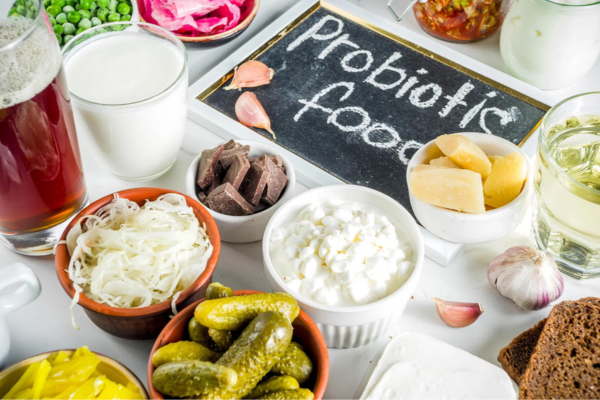
Explanation of Probiotics and Their Role in Gut Health
Probiotics are live bacteria and yeasts that are good for the digestive system, especially the gut. They work by restoring the balance of the gut microbiome, which can become disrupted due to poor diet, stress, antibiotics, and other factors. Probiotics help to increase the number and diversity of beneficial bacteria in the gut, which can improve digestion, boost immunity, and reduce inflammation. Probiotic-rich foods include yogurt, kefir, kimchi, and sauerkraut, among others.
Top Probiotic-rich Foods
Probiotic-rich foods are an excellent way to support gut health. Here are some top probiotic-rich foods:
- Yogurt: contains live cultures of Lactobacillus bulgaricus and Streptococcus thermophilus, which can help boost digestion and immune function.
- Kefir: a fermented milk drink that contains a range of probiotics, including Lactobacillus acidophilus and Bifidobacterium bifidum. Kefir can help improve digestion and reduce inflammation.
- Kimchi: a spicy Korean dish made from fermented vegetables, including cabbage, radish, and scallions. Kimchi contains a range of probiotics, including Lactobacillus kimchii, which can help promote a healthy gut.
- Sauerkraut: a fermented cabbage dish that contains a range of probiotics, including Lactobacillus plantarum and Leuconostoc mesenteroides. Sauerkraut can help improve digestion and support immune function.
Other probiotic-rich foods include kombucha, miso, tempeh, and pickles.
Health Benefits of Probiotic-rich Foods for Gut Health
Probiotic-rich foods offer numerous health benefits for gut health, including:
- Improved digestion: Probiotics can help break down food and improve nutrient absorption, which can reduce digestive symptoms like bloating, gas, and constipation.
- Boosted immunity: The gut is home to 70% of the body’s immune cells, and probiotics can help support immune function by promoting the growth of beneficial bacteria.
- Reduced inflammation: Probiotics can help reduce inflammation in the gut, which can lead to a range of health issues, including inflammatory bowel disease (IBD).
- Mental health benefits: There is a strong connection between gut health and mental health, and probiotics have been shown to improve mood and reduce symptoms of anxiety and depression.
- Reduced risk of chronic diseases: Probiotics may help reduce the risk of chronic diseases like type 2 diabetes, heart disease, and obesity by improving gut health and reducing inflammation.
Overall, consuming probiotic-rich foods can promote a healthy gut microbiome and lead to improved overall health and well-being.
How to Incorporate These Foods Into Your Diet
Incorporating probiotic-rich foods into your diet is easy and delicious. Here are some tips:
- Yogurt: Enjoy yogurt as a snack or as part of a meal. Choose plain, unsweetened yogurt for maximum probiotic benefits, and add fresh fruit, honey, or granola for flavor.
- Kefir: Kefir can be enjoyed on its own or added to smoothies. Try blending kefir with fruit and greens for a nutritious and probiotic-rich breakfast.
- Kimchi: Kimchi is a tasty addition to salads, sandwiches, and rice bowls. Try adding it to stir-fries or using it as a condiment.
- Sauerkraut: Use sauerkraut as a topping for hot dogs or sausages, or add it to sandwiches and salads. It also makes a great side dish for grilled meats and vegetables.
- Kombucha: Kombucha is a refreshing and probiotic-rich beverage that can be enjoyed as a replacement for soda or other sugary drinks.
Other ways to incorporate probiotic-rich foods into your diet include trying new recipes that feature fermented ingredients, like miso soup or tempeh stir-fry, or making your own fermented foods at home. Adding a variety of probiotic-rich foods to your diet can help promote a healthy gut microbiome and improve overall health and well-being.
For more information on dieting, read the following article Plant-Based Diet Benefits: 10 Reasons to Make the Switch
Fiber-rich Foods
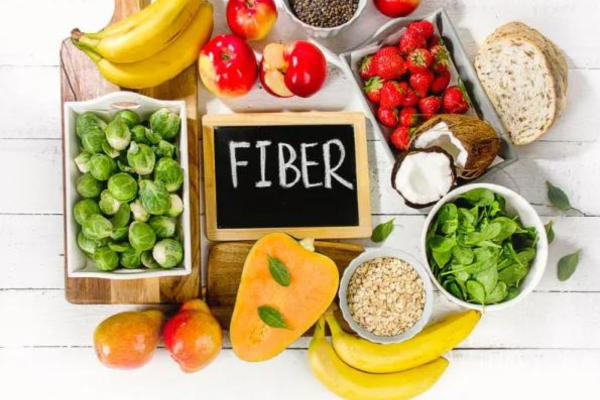
Explanation of Fiber and Its Role in Gut Health
Fiber is a type of carbohydrate found in plant-based foods like fruits, vegetables, whole grains, and legumes. Unlike other carbohydrates, fiber cannot be digested by the human body. Instead, it passes through the digestive system mostly intact, providing a range of benefits for gut health.
Fiber plays an important role in gut health by promoting regular bowel movements and preventing constipation. It also helps to feed the beneficial bacteria in the gut, promoting a healthy balance of microbiota. This is because fiber cannot be broken down by human digestive enzymes, but it can be fermented by gut bacteria. As they break down fiber, these bacteria produce short-chain fatty acids (SCFAs), which can provide energy for the cells lining the gut and help to reduce inflammation in the gut.
In addition to these benefits, a diet high in fiber has been linked to a reduced risk of chronic diseases, including heart disease, type 2 diabetes, and certain types of cancer. The recommended daily intake of fiber for adults is 25-30 grams, but many people fall short of this goal. To increase your fiber intake, focus on consuming a variety of whole foods like fruits, vegetables, whole grains, and legumes, and aim to include these foods in every meal.
Top Fiber-rich Foods
Here are some top fiber-rich foods:
- Beans and legumes: Lentils, chickpeas, black beans, and other legumes are high in both soluble and insoluble fiber, making them a great addition to any diet.
- Whole grains: Whole grains like oats, quinoa, brown rice, and whole wheat pasta are high in fiber and provide a range of other important nutrients.
- Fruits: Berries, apples, pears, and other fruits are high in fiber and can be enjoyed as a snack or added to meals and smoothies.
- Vegetables: Leafy greens, broccoli, carrots, and other vegetables are high in fiber and can be enjoyed raw, cooked, or roasted.
- Nuts and seeds: Almonds, chia seeds, flax seeds, and other nuts and seeds are high in fiber and healthy fats.
Incorporating these fiber-rich foods into your diet can help promote a healthy gut microbiome, improve digestion, and reduce the risk of chronic diseases. Aim to include a variety of these foods in your meals and snacks to ensure you are meeting your daily fiber needs.
Health Benefits of Fiber-rich Foods for Gut Health
Fiber-rich foods provide a range of health benefits for gut health, including:
- Promoting regular bowel movements: Fiber adds bulk to stool, making it easier to pass through the digestive system and reducing the risk of constipation.
- Supporting a healthy gut microbiome: Fiber feeds the beneficial bacteria in the gut, promoting a healthy balance of microbiota and reducing the risk of harmful bacteria overgrowth.
- Reducing inflammation: Short-chain fatty acids produced by gut bacteria during the fermentation of fiber have been shown to help reduce inflammation in the gut.
- Lowering the risk of chronic diseases: A diet high in fiber has been linked to a reduced risk of chronic diseases like heart disease, type 2 diabetes, and certain types of cancer.
- Helping with weight management: High-fiber foods are generally low in calories and can help to keep you feeling full and satisfied, reducing the risk of overeating and supporting weight management.
Incorporating fiber-rich foods into your diet is an important part of promoting gut health and overall well-being. Aim to include a variety of fiber-rich foods in your meals and snacks, and be sure to drink plenty of water to help the fiber move through your digestive system.
How to Incorporate These Foods Into Your Diet
Incorporating fiber-rich foods into your diet is easy and delicious. Here are some tips for getting more fiber in your diet:
- Start your day with fiber: Choose high-fiber breakfast foods like oatmeal, whole grain toast, or a smoothie with berries and chia seeds.
- Snack on fiber: Instead of reaching for processed snacks, choose fresh fruits, veggies with hummus or nut butter, or nuts and seeds for a fiber-rich snack.
- Swap refined grains for whole grains: Choose whole grain bread, pasta, and rice instead of their refined counterparts for a fiber boost.
- Add fiber to your meals: Add beans or lentils to soups, stews, or salads, or incorporate veggies like spinach or kale into your pasta dishes.
- Make veggies the star of your meals: Aim to make half of your plate filled with colorful vegetables to increase your fiber intake and support gut health.
Incorporating fiber-rich foods into your diet doesn’t have to be difficult or complicated. By making small changes to your meals and snacks, you can increase your fiber intake and support a healthy gut microbiome.
Prebiotic-rich Foods
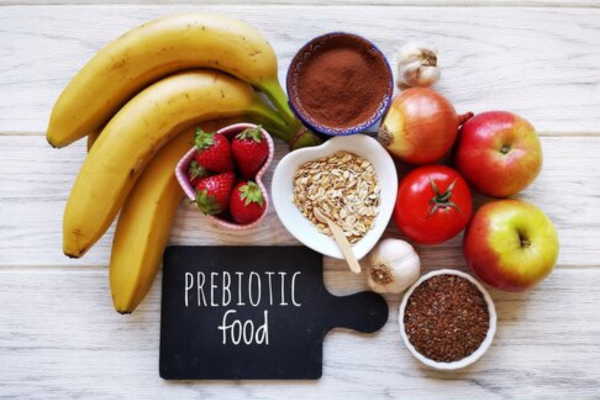
Explanation of Prebiotics and Their Role in Gut Health
Prebiotics are a type of dietary fiber that serve as food for the beneficial bacteria in the gut. They are not digested in the small intestine but instead pass through to the colon, where they are fermented by the gut bacteria. This fermentation process produces short-chain fatty acids (SCFAs), which have been shown to have numerous health benefits for the gut and overall health.
Prebiotics play a key role in promoting gut health by selectively promoting the growth of beneficial bacteria in the gut, while inhibiting the growth of harmful bacteria. This can help to maintain a healthy balance of microbiota in the gut and support immune function.
Some common sources of prebiotics include:
- Chicory root: Chicory root is a rich source of inulin, a type of prebiotic fiber.
- Jerusalem artichoke: Jerusalem artichoke contains a type of prebiotic fiber called inulin.
- Garlic: Garlic contains a prebiotic fiber called fructooligosaccharides (FOS).
- Onions: Onions contain FOS, which acts as a prebiotic to feed the beneficial bacteria in the gut.
- Bananas: Bananas contain a prebiotic fiber called resistant starch, which promotes the growth of beneficial bacteria in the gut.
Incorporating prebiotic-rich foods into your diet can help to support a healthy gut microbiome and promote overall health. Aim to include a variety of prebiotic-rich foods in your meals and snacks to support gut health.
Top Prebiotic-rich Foods
Here are some top prebiotic-rich foods:
- Chicory root: Chicory root is the richest source of inulin, a type of prebiotic fiber.
- Jerusalem artichoke: Jerusalem artichoke is also a good source of inulin.
- Garlic: Garlic contains a prebiotic fiber called fructooligosaccharides (FOS).
- Onions: Onions are a good source of FOS, which acts as a prebiotic to feed the beneficial bacteria in the gut.
- Leeks: Leeks contain a type of prebiotic fiber called fructans.
- Asparagus: Asparagus contains a prebiotic fiber called inulin.
- Bananas: Bananas contain a prebiotic fiber called resistant starch, which promotes the growth of beneficial bacteria in the gut.
- Apples: Apples are a good source of pectin, a type of prebiotic fiber.
- Cocoa: Cocoa contains a prebiotic fiber called flavanols, which can help to promote the growth of beneficial gut bacteria.
- Flaxseeds: Flaxseeds contain a prebiotic fiber called lignans, which can help to promote the growth of beneficial gut bacteria.
Incorporating prebiotic-rich foods into your diet can help to support a healthy gut microbiome and promote overall health. Aim to include a variety of prebiotic-rich foods in your meals and snacks to support gut health.
Health Benefits of Prebiotic-rich Foods For Gut Health
Prebiotic-rich foods provide numerous health benefits for gut health, including:
- Promoting the growth of beneficial gut bacteria: Prebiotics act as food for the beneficial bacteria in the gut, helping them to thrive and multiply.
- Supporting a healthy gut microbiome: Prebiotics can help to maintain a healthy balance of microbiota in the gut, which is important for digestive health and immune function.
- Enhancing nutrient absorption: Prebiotics can help to enhance the absorption of certain nutrients, such as calcium and magnesium.
- Reducing inflammation: Prebiotics have been shown to have anti-inflammatory properties, which can help to reduce inflammation in the gut and throughout the body.
- Supporting weight management: Prebiotics can help to promote satiety and reduce food intake, which may support weight management.
- Improving bowel regularity: Prebiotics can help to promote bowel regularity and reduce the risk of constipation.
Incorporating prebiotic-rich foods into your diet can help to promote gut health and overall health. Aim to include a variety of prebiotic-rich foods in your meals and snacks to support gut health.
How to Incorporate These Foods Into Your Diet
Here are some tips on how to incorporate prebiotic-rich foods into your diet:
- Add chopped onions or garlic to your meals, such as soups, stews, or stir-fries.
- Snack on fresh fruits like bananas or apples, which are easy to take on-the-go.
- Incorporate whole grains like oats, barley, or whole wheat into your meals.
- Add asparagus, leeks, or chicory root to your salads, omelets, or sautéed vegetables.
- Use flaxseeds in baking or sprinkle them over your breakfast cereal or yogurt.
- Enjoy a cup of hot cocoa made with dark chocolate, which contains flavanols, a type of prebiotic fiber.
- Experiment with fermented foods like kimchi or sauerkraut, which contain both prebiotics and probiotics.
Incorporating prebiotic-rich foods into your diet can help to support a healthy gut microbiome and promote overall health. Aim to include a variety of prebiotic-rich foods in your meals and snacks to support gut health.
Fermented Foods
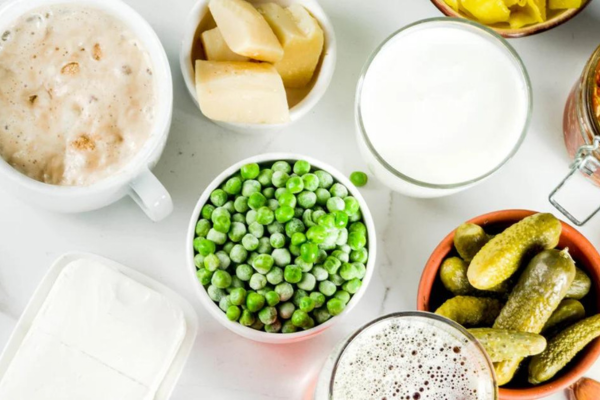
Explanation of Fermentation and Its Role in Gut Health
Fermentation is a process that occurs when microorganisms, such as bacteria or yeast, break down carbohydrates in food without using oxygen. This process results in the production of beneficial compounds such as probiotics, organic acids, and enzymes that are important for gut health.
Fermented foods are rich in probiotics, which are live microorganisms that provide health benefits when consumed in adequate amounts. Probiotics help to maintain a healthy balance of microbiota in the gut, which is important for digestive health and immune function. Fermentation also increases the availability and bioactivity of nutrients in food, making them easier to digest and absorb.
Fermented foods have been shown to have a number of health benefits, including:
- Supporting gut health: Fermented foods are rich in probiotics, which can help to promote a healthy gut microbiome.
- Improving immune function: Probiotics in fermented foods have been shown to stimulate the immune system and help to fight off harmful bacteria and viruses.
- Enhancing nutrient absorption: Fermentation can help to increase the bioavailability and absorption of certain nutrients, such as vitamins B and K.
- Reducing inflammation: Fermented foods contain anti-inflammatory compounds that can help to reduce inflammation in the gut and throughout the body.
- Supporting mental health: Emerging research suggests that the gut microbiome may play a role in mental health, and consuming fermented foods may have a positive impact on mood and stress levels.
Incorporating fermented foods into your diet can help to promote gut health and overall health. Aim to include a variety of fermented foods in your meals and snacks to support gut health.
Top Fermented Foods
Here are some popular fermented foods that are rich in probiotics:
- Yogurt: Yogurt is made from milk that has been fermented with live bacteria cultures. Look for plain yogurt that contains live and active cultures.
- Kefir: Kefir is a fermented milk drink that is similar to yogurt but has a thinner consistency. It is also rich in probiotics and can be found in most grocery stores.
- Kimchi: Kimchi is a spicy Korean condiment that is made from fermented vegetables, such as cabbage, radish, and scallions. It is a good source of probiotics and also contains fiber and antioxidants.
- Sauerkraut: Sauerkraut is a fermented cabbage dish that is often used as a condiment. It is rich in probiotics and also contains vitamin C and fiber.
- Miso: Miso is a traditional Japanese seasoning that is made from fermented soybeans, rice, or barley. It is a good source of probiotics and also contains protein and other nutrients.
- Tempeh: Tempeh is a fermented soybean product that is often used as a meat substitute. It is rich in probiotics and also contains protein, fiber, and other nutrients.
- Kombucha: Kombucha is a fermented tea drink that is made with a culture of yeast and bacteria. It is a good source of probiotics and also contains antioxidants and other beneficial compounds.
Incorporating these fermented foods into your diet can help to promote gut health and support overall health. Try adding them to your meals and snacks for a boost of beneficial probiotics.
Health Benefits of Fermented Foods for Gut Health
Fermented foods are rich in beneficial probiotics that can help to improve gut health in several ways. Some of the health benefits of consuming fermented foods include:
- Improved digestion: The probiotics in fermented foods can help to improve digestion by promoting the growth of healthy gut bacteria and aiding in the breakdown of food.
- Boosted immunity: Fermented foods contain beneficial bacteria that can help to support the immune system by fighting off harmful bacteria and viruses.
- Reduced inflammation: The probiotics in fermented foods can help to reduce inflammation in the gut, which may help to alleviate symptoms of inflammatory bowel disease and other digestive disorders.
- Improved nutrient absorption: The beneficial bacteria in fermented foods can help to improve nutrient absorption by promoting the growth of healthy gut bacteria.
- Enhanced mental health: There is some evidence to suggest that consuming fermented foods may help to improve mental health by promoting the growth of healthy gut bacteria that produce neurotransmitters like serotonin.
Incorporating fermented foods into your diet can provide a range of health benefits and help to promote overall gut health.
How to Incorporate These Foods Into Your Diet
Incorporating fermented foods into your diet is relatively easy and can be done in a number of ways. Here are some tips for adding more fermented foods to your meals:
- Start with small portions: If you’re new to fermented foods, start by incorporating small portions into your diet to allow your body time to adjust.
- Add fermented foods to meals: You can add fermented foods like kimchi or sauerkraut to salads, sandwiches, or bowls for a tangy, probiotic boost.
- Use fermented condiments: Condiments like miso or tempeh can add a savory, umami flavor to dishes and provide a dose of probiotics.
- Drink kombucha: Kombucha is a fermented tea that can be found at most grocery stores and can be a refreshing way to add probiotics to your diet.
- Make your own fermented foods: Making your own fermented foods like yogurt, kefir, or sourdough bread can be a fun and rewarding way to incorporate more probiotics into your diet.
By incorporating these tips into your daily routine, you can easily increase your intake of fermented foods and support a healthy gut.
Anti-inflammatory Foods
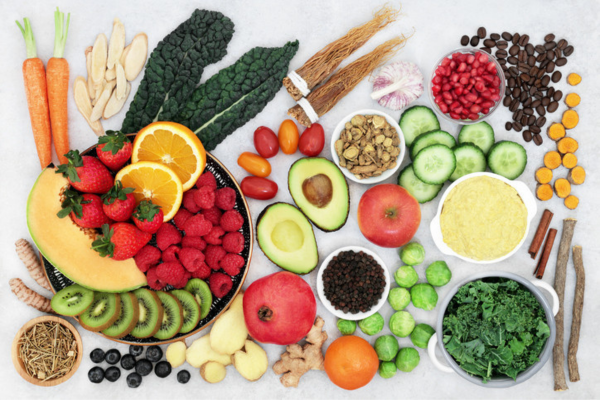
Explanation of Inflammation and Its Role in Gut Health
Inflammation is a natural immune response that occurs when the body is under stress or fighting off an infection. While acute inflammation can be beneficial in the short term, chronic inflammation can be harmful to the body, particularly to the gut.
Chronic inflammation in the gut can damage the intestinal lining and disrupt the balance of healthy gut bacteria, leading to a range of digestive problems, including inflammatory bowel disease (IBD), irritable bowel syndrome (IBS), and leaky gut syndrome.
In addition to digestive issues, chronic inflammation in the gut has also been linked to other health problems, including autoimmune diseases, cardiovascular disease, and even mental health issues like depression and anxiety.
Reducing inflammation in the gut is an important part of maintaining overall gut health and can be achieved through a healthy diet that includes anti-inflammatory foods, as well as lifestyle changes like stress management and regular exercise.
Top Anti-inflammatory Foods
Here are some top anti-inflammatory foods to incorporate into your diet:
- Fatty fish: Fatty fish like salmon, mackerel, and sardines are rich in omega-3 fatty acids, which have potent anti-inflammatory properties.
- Berries: Berries like strawberries, blueberries, and raspberries are rich in antioxidants and flavonoids, which can help to reduce inflammation in the body.
- Leafy greens: Leafy greens like kale, spinach, and collard greens are packed with nutrients like vitamin K and antioxidants that can help to reduce inflammation.
- Turmeric: Turmeric is a spice that contains the compound curcumin, which has potent anti-inflammatory effects.
- Nuts: Nuts like almonds and walnuts are rich in healthy fats and antioxidants that can help to reduce inflammation.
- Olive oil: Olive oil is a healthy fat that contains oleic acid, which has been shown to have anti-inflammatory effects.
- Whole grains: Whole grains like brown rice, quinoa, and oats are rich in fiber and other nutrients that can help to reduce inflammation.
By incorporating these anti-inflammatory foods into your diet, you can help to reduce inflammation in your gut and support overall gut health.
Health Benefits of Anti-inflammatory Foods for Gut Health
Incorporating anti-inflammatory foods into your diet can have a number of health benefits for your gut. Chronic inflammation in the gut can contribute to a number of digestive disorders, including inflammatory bowel disease (IBD), irritable bowel syndrome (IBS), and leaky gut syndrome.
Anti-inflammatory foods can help to reduce inflammation in the gut by providing important nutrients like omega-3 fatty acids, antioxidants, and fiber. These nutrients can help to reduce oxidative stress and inflammation in the gut, while also supporting the growth of beneficial gut bacteria.
Studies have shown that consuming anti-inflammatory foods can help to improve symptoms of digestive disorders like IBD and IBS, including reducing abdominal pain, bloating, and diarrhea. Additionally, consuming a diet rich in anti-inflammatory foods has been linked to improved gut microbiome diversity, which is important for overall gut health and immune function.
Overall, incorporating anti-inflammatory foods into your diet can help to reduce inflammation in the gut, support beneficial gut bacteria, and improve symptoms of digestive disorders.
How to Incorporate These Foods Into Your Diet
Incorporating anti-inflammatory foods into your diet can be easy and delicious. Here are a few ways to add more anti-inflammatory foods to your meals:
- Add some color to your plate: Colorful fruits and vegetables like berries, leafy greens, and tomatoes are packed with anti-inflammatory nutrients. Add them to salads, smoothies, or as a side dish.
- Use healthy fats: Olive oil, nuts, and seeds are great sources of healthy fats that can help to reduce inflammation. Use olive oil for cooking, add nuts and seeds to salads or oatmeal, or make your own trail mix.
- Try herbs and spices: Herbs and spices like ginger, turmeric, and cinnamon have powerful anti-inflammatory properties. Add them to your meals to give them a flavorful boost.
- Eat fatty fish: Fatty fish like salmon, tuna, and mackerel are rich in omega-3 fatty acids, which have been shown to reduce inflammation. Try adding them to your meals a few times a week.
- Swap out refined carbs: Refined carbohydrates like white bread and pasta can contribute to inflammation. Try swapping them out for whole grain options like brown rice, quinoa, and whole grain bread.
By incorporating these anti-inflammatory foods into your diet, you can support your gut health and overall wellness.
Frequently Asked Questions
Q: What are the top 5 foods for a healthy gut?
A: The top 5 foods for a healthy gut are yogurt, kefir, kimchi, sauerkraut, and kombucha.
Q: What makes these foods good for gut health?
A: These foods are good for gut health because they contain live bacteria known as probiotics, which can help to promote the growth of beneficial bacteria in the gut.
Q: How can I incorporate these foods into my diet?
A: You can incorporate these foods into your diet by adding them to your meals as a side dish or snack. For example, you can add yogurt or kefir to your breakfast smoothie or have sauerkraut as a side dish with your lunch.
Q: Are there any risks associated with eating these foods?
A: For most people, these foods are safe to eat and can provide a range of health benefits. However, if you have a weakened immune system or have been advised to avoid certain foods by your doctor, you may want to speak with a healthcare professional before incorporating these foods into your diet. Additionally, some people may experience mild digestive symptoms like bloating or gas when first introducing these foods into their diet, but these symptoms usually subside over time.
Conclusion
In conclusion, maintaining a healthy gut is crucial for overall health and well-being. Incorporating the top 5 foods for a healthy gut – probiotic-rich foods, fiber-rich foods, prebiotic-rich foods, fermented foods, and anti-inflammatory foods – into your diet can greatly improve your gut health.
By doing so, you may experience benefits such as improved digestion, increased energy levels, and better immune function. Remember to make these foods a regular part of your diet and pair them with a healthy lifestyle for optimal gut health.



